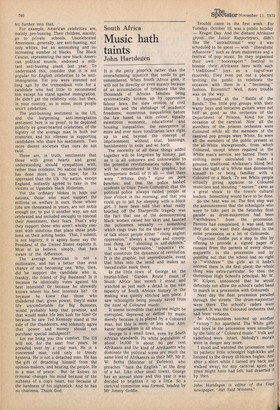South Africa
Music hath taints
John Hartdegen
It is the petty pinprick rather than the overwhelming injustice that tends to get remembered. When South Africa goes, it will not be directly or even mainly because of an accumulation of tyrannies like the thousands of African families being systematically broken up by oppressive labour laws; the slow erosion of civil liberties and the shrinkage of academic freedoms; monstrous inequalities before the law based on skin colour; equally monstrous economic, educational and housing inequalities; the emergence of more and ever more totalitarian laws right up to and beyond the concept of imprisonment without trial, bannings, banishments in exile and so fort'h.
The enormity of all t'hese things added together will be forgotten by history, just as it is all unknown and unknowable to
the potential revolutionaries today. What will be remembered is the graphic, but
unimportant detail of it all — that there
were "Whites Only " signs on park benches; and that the police bashed
students in Cape Town Cathedral; that the political police always raided, people at four o'clock in the morning; and that you could go to jail for sleeping with a black girl. I have been told that what really touched off the Sharpeville tragedy was the fact that one of the demonstrating black women raised her skirt and taunted the policemen sexually — something which rings truer for me than any amount of talk about people either " rising aaginst oppression," always a vague and concep tual thing, or " shooting in self-defence." It is not 'oppression,' 'injustice ' etc. that constitute the dynamics of revolution.
It is the graphic, but unpredictable, event that bites into the mind and makes an ineradicable mark there.
In the little town of George on the tourist-billed 'Garden Route ' coast of South Africa last month I stood and watched as just such a detail in the vast tapestry of South African history in the making was quietly stitched into place. I saw schoolgirls being piously saved from the taint of Coloured music.
It seems incredible that anyone might be corrupted, depraved or defiled by music merely because it is played by a Coloured man, but this is more or less what Afrikaner imperialism is all about.
George is a small town, even by South African standards. Its white population of about 14,000 is about 80 per cent Afrikaans and the kind of Afrikaners who dominate the political scene are much the same kind of Afrikaners as their MP, Mr P. W. Botha (Minister of Defence), who preaches " hate the English " at the drop of a hat. Like other small towns, George has an annual show and this year it was decided to brighten it up a little. So a carnival committee was formed, headed by Mr Jimmy Goldie. Trouble came in the first week. For Tuesday, October 10, was a public holiday — Kruger Day. And the diehard Afrikaner group, the Junior Rapportryers, didn't like the " untraditional " way it was scheduled to be spent — with " liberalistic influences " such as drum majorettes and a festival of pop music. So they organised their own " booeresport " festival to honour their Afrikaner hero with such " traditional" joys as a tug-of-war (toutrek). They even put out a placard inviting the public to celebrate the occasion with them in a " becoming " fashion. Eccentric? Well, more trouble was on the way.
It happened at the "Battle of the Bands." The little pop groups with their warty boys and imitative guitars were not half as good as the orchestra of the Department of Prisons, hired for the occasion of the carnival. Now all the members of the prisons orchestra were Coloured while all the members of the carnival pop groups were White. So were all the members of the public present at the all-White showgrounds, from which Coloured, except where required in the White man's service, are barred. There is nothing more calculated to make a genuine, traditional Afrikaner's blood boil than the sight of a White man demeaning himself to or being familiar with a Coloured or a Black. To see White people actually giving applause to Coloured musicians and shouting " encore " came as a great shock to the town's cultural leaders. Something would have to be done. So 'the heat was on. The first step was the announcement that the schoolgirls who were to take part in the Saturday float parade as drum-majorettes had been " withdrawn " from the procession.
Parents had complained, it was said, that they did not want their daughters in the same procession as a lot of Coloureds.
Organiser Goldie put a stop to this by offering to provide a signed paper of consent from the parents of every drum majorette in the procession and by pointing out that the school had no right to " withdraw" the girls as it hadn't entered them in the first place; the whole thing was extra-curricular. So then the Outeniqua Hig'h School's principal, Mr W. W. Kilpert, announced that he would. definitely not allow the school's cadet band to march in a procession with Coloureds.
Next day the float procession paraded through the streets. The drum-majorettes were there. The school's cadets were present. It was the Coloured orchestra that had been verboten.
So Afrikanerdom notched up another " victory " for apartheid. The White girls and boys in the procession were unsullied by the taint of" Coloured music." Volk and vaderland were intact. Nobody's morals were in danger any more.
I stood and watched the procession with its pathetic little schoolgirl high-kicks and listened to the dreary ill-blown bugles. And after a short while I turned my back and walked away, for any carnival spirit the town might have had left, had deserted it by then.


















































 Previous page
Previous page